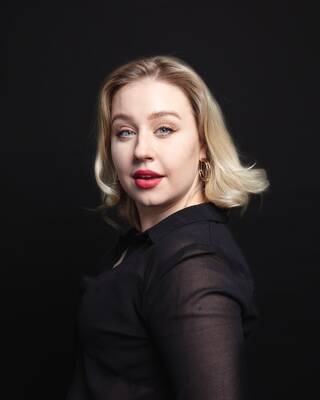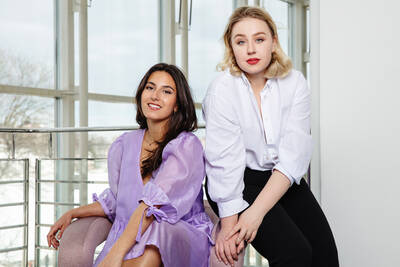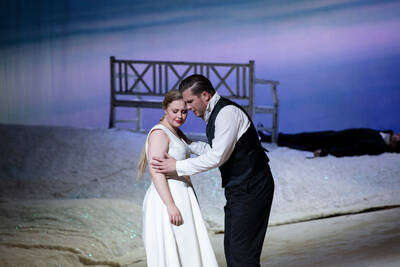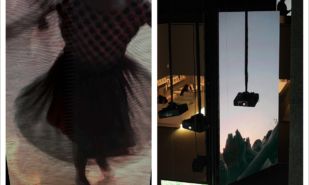Elisaveta Rimkevitch is a member of the Young Artist Program at the Finnish National Opera and is singing Tatyana in Eugene Onegin in the production by Marko Arturo Morelli this week. We have talked to Elisaveta about the everyday life of a young and aspiring opera artist.
Rising Star at the Finnish National Opera: Elisaveta Rimkevitch’s Journey from Pianist to Opera Sensation
| Author | |
|---|---|
| Category | Columnists, Culture, Lifestyle, People, Town |
| Date | February 15 2024 |
| Reading Time | 13 min. |
Rising Star at the Finnish National Opera: Elisaveta Rimkevitch’s Journey from Pianist to Opera Sensation

Elisaveta, could you describe your background? Where did you go to musical school, what were the milestones of your education as a singer?
Well, I started as a pianist. I was five years old when I started my musical school. And I was playing for quite many years until almost professional level, and I had to apply to Sibelius Academy to study piano, solo piano. But at the same time, the same spring, after high school, I applied to Sweden, to Kungliga Högskolen to learn to sing. And that was the first time when I got in, and I got encouraged that maybe I should indeed choose singing. I actually had started singing also, but later, when I was a teenager. In that Swedish school I was supposed to begin a course in pop jazz singing,so it wasn’t meant to be classical, but I didn’t specify it in application, so by accident I got into the classical singing course. And I liked it, and I continued my journey. And the same spring, I also applied to Sibelius Academy. I decided that, okay, forget the piano, I will start singing now. And I got into Sibelius Academy, and I stayed here. So I did my BA and MA levels here. And during my studying time, I was doing a lot of competitions here, and every time, I ended up a finalist in every competition… We have many national singing competitions here in Finland, and I was pretty successful there. And then, in the Helsinki Lied competition, we got the third prize with Niina Ranta accompanying me, she’s indeed a great pianist. And then the Lappeenranta National competition was held in the beginning of this year, and I also won the third prize. So that started off my career. But I think I was somehow seen before, because I was auditioning already when I was studying in Sibelius Academy. I was also nominated by Pro Musica Foundation as a Young Artist of the Year in 2017. And pretty much after that I got my first audition here at the Finnish National Opera. So that was my education.
When you were studying, have you been on the lookout for the same positions, or auditions, say, at other European opera houses? Or was being at FNOB (Finnish National Opera and Ballet) specifically what you wanted?
I was thinking of searching other places, but since they started this Young Artist program here, I thought, why not? Why not to apply? And I applied already before the Lappeenranta competition. And I applied and got in. But I definitely think that I will go to other European opera houses after this. So, this is just a 10-month trainee programme. I’m not going to stay here permanently. I want to go abroad at some point as well.
Could you describe the specifics of this Young Singers program? What does it give you? How does it support you? Why is it important to be part of it as a step in your career?
Well, as we know, many opera houses have these studios where young artists can get to know the work they’re going to do in future and get a kickoff start. Actually, we, me and another singer, are the first ones in it. For many years there had been a pause. There wasn’t any program for young artists at the Finnish National Opera for many years. They are very open to our needs – we plan everything with the management. We discuss what we need at this point, and they want to give us what we need. The Opera doesn’t plan it as some structural thing we have to do, we had a conversation about our needs after our audition. They gave us roles for the next season that are going to be beneficial for our voices, hopefully. And it’s basically the same work that opera singers do. Except we have more coaching with choral pedagogues. We have more coaching with languages. We also asked for master classes from visiting stars who are coming to the Opera. Hopefully, we get to sing with them if they want to teach us, of course. And it’s pretty much what we need. And that’s why I love this place. Because this is the first Young Artist program after many years. We can build it for us. And we can build it for the next generation as well.

I wonder if you have heard of the same program in London, at the Royal Opera House.
I have heard that they also have it, yes. I’ve heard about it. It’s like five people per year or ten people per year. Yes, usually they take one of each voice. I’ve been expecting that they take the same amount here. But it was only us two out of 300 people. So, that was a big success. Definitely.
Since you are a novice at this opera, could you talk about the experience of the Finnish Opera through the eyes of the person who has been here before as a spectator, but who has started this journey as a young artist. What is it like working here? How do your days go? Give us an experience of the opera from inside.
Well, the first thing that I liked here is that people are so friendly. In general, I expected that opera is like Hollywood and it is business. And there are a lot of nasty people. But not here. I came into the house and the first person that met me hugged me immediately. All the choir members, all the staff are so nice. And they’re so well selected. That means we have a very good community here at the Finnish Opera. And it was also very easy to come here because I know a lot of people. I’ve been working also at the Savonlinna Opera Festival in a choir and as a soloist. I was so happy to see their faces and they were greeting me. It was easy to fit in. And if I would go somewhere else, it would be different. It’s easier when you’re not alone.
In the profession, how do the days go? How many days do you spend here? What are you expected to do?
Well, our contract is the same as the basic opera singer contract. The choir members and we are under the same contract rules. So we have to do seven hours each day, five days a week. It is 35 and a half hours minimum a week. But you can spread it as you want. If you have some fixed rehearsals, like stage rehearsals, we usually have them in the morning and something in the evening. It depends a lot. Then we have choral repetitions, they are fixed during the week. And that’s how we build our working days. You go to the stage rehearsals with the directors, and in your free time you just study the roles.
And how do you do it? Say, for Donna Elvira in Don Giovanni that is in your repertoire this year. How did you train for this role? Who was your mentor? Could you describe the process of rehearsals with the Finnish Opera Chief Conductor Hannu Lintu and with the director of the production Jussi Nikkilä?
In preparing for the whole role, I like to start with the texts because it’s the most important thing. The story has to be understood. You have to understand it yourself. So I translate everything into Finnish, and not just my part, I want to know what is happening in the opera. Finnish is the easiest for me. I want to know what every character is doing there. Then I build myself a mind map of my character. How is it related to everyone? I’ve been doing some theatre during my studies in Sibelius Academy, as they also have a Theatre School there. I did one year of theatre courses there and we did everything that theatre students usually do during their Bachelor program in Theatre. There we studied the process of preparation for your role. You make this mind map of how your character is related to everyone, and how it feels he or she feels different situations and scenes. I start with that, and this acting stuff takes me maybe a week. Surely, I already think about music at the same time, does music support that text, and what does it mean, and how does the text affect the music? And why was it written that way?
And is Donna Elvira the new role for you? Or have you sung it in your students’ years?

Donna Elvira is a new one. So I had to do it from the start. I’m also doing a cover for Rosalinda in Die Fledermaus, and that I have done before. So it is a bit easier, but we have completely different text in this production, and it is in Finnish. The character is the same of course, so it is easier and faster. And then music preparation which has to be done very well. Technically I have to put each note in its place. Now I study with Jaako Ryhänen who is a famous Finnish bass. He’s already over 70 years old. He has been singing with many stars around the world. For now he is my mentor. After the Academy I was searching for a teacher and now I finally found one who knows a lot about the opera industry and has worked on big stages, has heard very famous voices so he knows how this goes. He is a very sweet guy. He usually has a pianist, so you pay a pianist, then you pay Jaako Ryhänen, and then he listens through your role and fixes stuff, like if something is not in place, usually it’s technical advice. So, he’s not intervening with your character, he leaves it to you and to the coaches here in the opera because it always depends on the director how he sees or she sees the character or the story and you cannot fix it completely in your mind, you have to be flexible as an artist. Jaako is mainly fixing music, music and technical stuff of singing for a singer.
And then you come to coaches here after you have done your private coaching, right?
Yes, yes. Actually, I wasn’t sure how well I should be prepared during the choral repetition. I came already prepared, I have studied the role and they were like, what are you doing here? You could have taken it more easily, but because I didn’t know, I didn’t know what they expected from me, so I was trying to be ready. There is also, closer to the end, a Sitzprobe when all singers are present and they just sit on the chairs in the orchestra room, hence the name. But the first time the choral repetitors are contacting you and saying, let’s go through this role. After the choral repetition, we have stage rehearsals where no orchestra is involved yet. Stage rehearsals with the director and also with the conductor. And there is a pianist and we are doing the scenes. Yes. And after that, like almost two weeks before performance, the orchestra comes because it’s the most expensive part. So, we have one Sitzprobe with them, then probably one or two rehearsals, then a general rehearsal, and then we go on stage. And when I have three days left before the performance… I have noticed that if you do the whole work in advance, it is better to just stay silent and hydrate and do yoga. It’s the most helpful way. So you actually need not to overwork it before the premiere. Take a rest for three or four days before the premiere. Or just at least one day before the performance, if you need to work before the premiere. But I think it’s really important to do it like that because it takes a lot of energy on stage. It depends on the character, it depends what you are singing, but somehow for my body, it is always very physical. You are sweating every time you come on the stage and I really need that energy. I need to sleep a lot, drink water and exercise to get that fluid going. Without good hydration and fluids, it’s very hard to sing.
That’s indeed important because, you know, I’ve been hearing from some singers that they change their diet before the premiere.
Especially if you have allergies or something like that, then you of course have to know what is affecting your body and in which way, but there is no definite answer for everyone. You have to know your own body. And for me, hydration is the most important. If you eat chocolate just before you go on stage, it is hard to sing. But you need the energy and some sustainable breakfast, lunch, and just keep your energy levels up by sleeping and eating well and exercising.
And you know, here at the Finnish Opera, they have the facilities, they have a gym and a sauna. Are you using it for this process of preparation?
I’m going to the gym, probably not every day, because I also go to the gym outside of the opera house. If you train a lot with big weights, it makes you puffy. You collect a lot of fluids and it is hard to sing, because you cannot use all the muscles you need for singing. So you have to know when to exercise and what type of exercise you need. Three days before the performance I can go and pump my muscles and maybe do something easier just before the show, just stretching.
Could you describe the performance and the actual working process with the conductor Hannu Lintu. Could you share the tips of how the singer follows the signs of the conductor? What can go wrong in their interaction on stage?
Well, if you don’t follow the conductor, then everything goes wrong. I mean you can rely on your hearing when you’re next to the orchestra and standing very close to the orchestra pit. There you can listen, but also we have many monitors, so you can watch. It’s better if you watch the conductor, but if you’re acting, you cannot watch him all the time. But the further you go on stage, the further you go from the conductor, the more difficult it gets. You have to really, really be on time and without relying on your hearing, because if you’re listening, you’re going to be late, as now there will be the distance of the sound. 10 metres and it’s already half a second late. So if you breathe late, you’re going to be late. And then everybody follows you and something wrong happens. Hannu Lintu, the Chief Conductor of the Finnish Opera, is very intense, he’s very precise. You can see that he loves doing music. He loves to be in that world. And he’s so mesmerised by everything that he’s doing. He is very concentrated and is asking very much from singers, also from younger artists, everything has to be on point. If we have stage rehearsals, after that the director gives space to the conductor to fix some musical things, and then he can talk to you. It’s very simple musical work.
Could you describe your first proper full run through of Don Giovanni?

Yes, we had two general rehearsals in a row. God, it was hard for me for some reason, I’m not a morning person, so I had to wake up at like 7.30 and get my body started and to do the same again next day. It was intense, but somehow when the director and everyone stopped commenting, somehow the theatre magic appeared. And it was so nice. And it was nice even though some mistakes happened and after that we got to hear feedback. Somehow it just became alive at that moment and it was a nice experience.
How do you feel about the house? Is it a welcoming house? Is it too big for you? Is it the right size? Because it’s quite a big building, it’s a modern one, very beautiful, but maybe you would have liked, on the contrary, say, for it to be an old European one with all the columns and so on.
I don’t mind. Somebody is laughing that this looks like a swimming hall. About the building – you can get lost in here, it’s not so simple. I still don’t know every corner in this house. I think compared to the sizes of stages, let’s say Europe, it’s a mid-size stage. I feel like my voice is just enough for it. If it were a bigger or there were a larger orchestra, that would be harder.
As the opera is quite expensive, the audience tends to be consisting of people in their 50s and their 40s or older. How do you think, like, you as a young person, like, how do you feel, what are the ways to invite the young people into the audience? And whether in your life, in your circles, do people go to the opera and specifically to the Finnish national orchestra?
Well, I think it starts, of course, from home and how you educate your children. They have these open concerts for kids here of Carmen and other operas and ballets where it is staged, and they have nice costumes, so they try to bring children into opera. To attract the younger audiences, the productions have to be up to date, not using old thinking and old jokes. If they come here they might not understand the jokes that 60-year-olds understand. But it also has to be suitable for everyone, for each age. New stagings are always interesting. The thing this Opera House did is they went for a tour in different cities of Finland, as it is the only opera in the country. It was a great opportunity for people in the North to see the opera for the first time.
Do you think you might be using the fact of being a Russian speaker here in the Opera?

I am appearing as Tatyana in Eugene Onegin. It is a huge role, and, honestly speaking, I am scared, because I had always thought that Tatyana is for a 35-year old singer, the one who is completely ready and has done all the technique. But then the director came up to me and said ‘Do you know that Tchaikovsky composed this piece for students? No stress, just do your work well’. Marco Arturo Morelli would be directing it, and also do the staging and sets for it, and the Kazakh conductor Alan Buribayev would be in charge for the musical part of it.
Have you sung Eugene Onegin in your student years?
I have sung the letter scene and also the last scene with Onegin, it is a big role, you cannot just sing it through in preparation. After Donna Elvira and Rosalinda I feel definitely more prepared, but I am very nervous.
Have you seen Onegin on stage?

I saw the version of the Metropolitan Opera with Anna Netrebko as they broadcast it in cinemas.
What are your plans for the season? Tell us about your roles.
The roles are fixed for the season, though I can discuss them with the Opera manager if I feel uncomfortable about some roles. So it is Donna Elvira, covering for Rosalinda (I am a stage cover, so I have to be present at stage rehearsals), then Tatyana, and then I am covering one of the Valkyrie sisters in Götterdämmerung.
What does opera and singing give you as a person?
My friends notice that it is a stressful profession, you have to cancel some parties, so it is restrictive sometimes, but you also get much joy from this job, so this balances things out. I am not becoming another person through singing. Sometimes you can’t show everything, you learn to act, you think about whether you can trust everybody, you begin to show some sides while hiding others. You create a professional profile of how you want to be seen and sometimes it is not the same side you show to your family.
What are your plans for your career in 5 years?
You have to join the agency to build your career, I need to find one during this year. Definitely I need to visit Germany. I also once auditioned for Oslo Opera House. It is beautiful, I would love to live there for sometime, and my favourites are Bayerische Oper in Munich or Staatsoper in Berlin. I would be happy to be at the Royal Opera House. My dream is to sing roles in Guiseppe Verdi and Puccini’s operas – Traviata, Madama Butterfly, La Bohème. I would love to do Kaija Saariaho’s operas, as well. I am open to new things in my development, but big soprano roles in the repertoire are my dream ones, surely.




